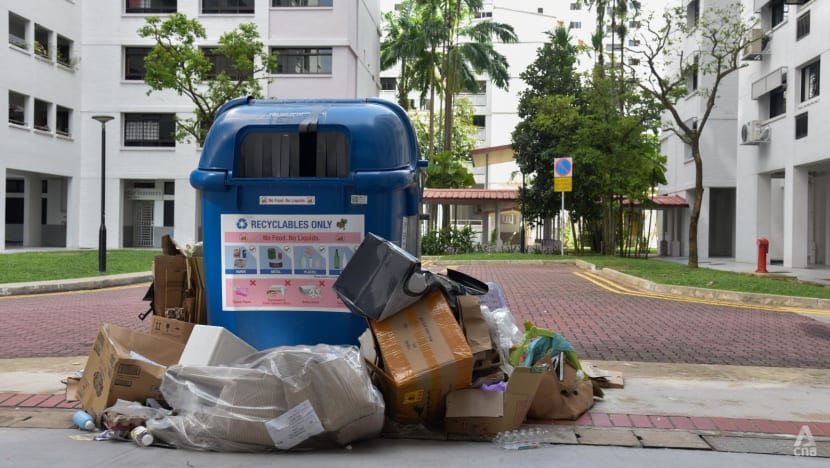Your chilli sauce packet could be contaminating several batches of recyclable items
Improving the recycling situation may hinge on the younger generation, experts said.

File photo of a recycling bin in Singapore (Photo: CNA/Javier Lim)

This audio is generated by an AI tool.
SINGAPORE: Contamination by food waste is one of the biggest challenges in recycling in Singapore, said an industry player.
One contaminated recycling bin has the potential to ruin several batches of items because they all go into the same truck, said Mr Derek Chong, senior manager of operations at Chye Thiam Maintenance, which provides recycling services.
“If we are collecting recyclables from 10 different locations … once that one single contaminant goes in, it contaminates the entire 10 batches,” he said.
“For example, the gravy from your leftover food, the chilli sauce, these are food waste contaminants … Once that is mixed with recyclables, the recyclables cannot be used.”
The overall recycling rate in Singapore declined from 62 per cent to 52 per cent over the last decade, according to the National Environment Agency’s (NEA) latest statistics on waste and recycling.
Domestic recycling rate remained at 12 per cent.
Under Singapore’s Zero Waste Masterplan, the country aims to increase its overall recycling rate to 70 per cent by 2030.
Associate Professor Johan Sulaeman, director of the National University of Singapore’s Sustainable and Green Finance Institute, urged people to take recycling more seriously.
“Please pay close attention to what you are actually trying to recycle. Don't just throw trash into the recycling bin,” he said.
He noted that recycling in Singapore is quite convenient. “People just need to know that it's that easy,” he added.
CONSUMING LESS AND REDUCING WASTE
Despite the declining recycling rate, there was some good news in NEA’s report.
The domestic waste generated per capita – collected from households and trade premises such as schools and hawker centres – decreased by more than 15 per cent over the past decade.
Assoc Prof Sulaeman said this means people are more efficient in their consumption of resources.
“That means that we are wasting less of the resources. I don't think people are consuming less, but I think we are now consuming more efficiently and I think that's crucial as well,” he said.
Consuming less is another way to help the environment, he added.
“(By) reducing waste, we can recycle less because we don't have waste to recycle to begin with,” he said.
On top of having a goal for recycling rates, there should be a goal on total waste consumption, he added.
Both Mr Chong and Assoc Prof Sulaeman stressed that awareness and education hinge on the young.
“In schools, we must learn to teach our younger generation what's the proper recycling method, what are things we should not be throwing into the recycling bin because one person can cause the whole recycling bin to be damaged, and not be used,” said Mr Chong.
Assoc Prof Sulaeman noted that the younger generation will have a longer runway to benefit the society through recycling and the reduction of resource usage. They can also help to educate the older generation, he said.
“It’s very difficult to change the way you live and your lifestyle. But I think there is still a way for the younger generation to affect the mindset of the older generation and change their behaviour,” he said.
FIRMS DO THEIR PART
The non-domestic recycling rate decreased to 67 per cent from 72 per cent in 2022.
One firm that has been trying to do its part in improving these rates is Marina Bay Sands.
Among its food waste reduction initiatives is a food waste tracking technology, which uses artificial intelligence to analyse the type and volume of food waste.
“It's also mobile, so our chef can move it around the meeting venues, and then they can (review) the type of food waste and adjust the portion in the future,” said Ms Meridith Beaujean, the integrated resort’s executive director of sustainability.
Using technology, MBS is able to transform 8,500kg of daily food waste into non-potable water or a high calorific substrate that can potentially be used as soil fertiliser or insect feed, she said.
The resort also works with a Singapore company to upcycle and recycle used chopsticks which are turned into, among other things, menu cubes.
Assoc Prof Sulaeman said that recycling is a joint effort.
“A person may not make a difference, but if nobody makes a difference, then no difference will happen. Everybody will have to put in their small but important … contribution to the society,” he said.
“I hope that everybody will have that sense of community to respond to this call of increasing the rate of recycling because even a small difference makes a huge difference when you're aggregating across the island.”


















